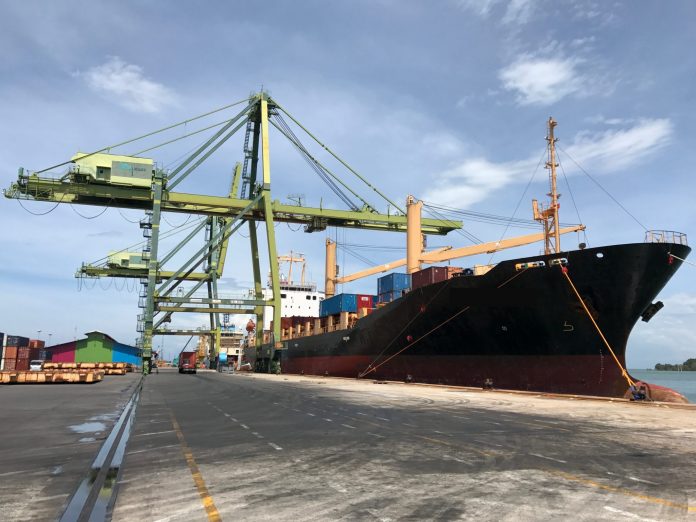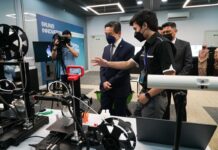The Brunei Darussalam National Single Window (BDNSW) – a common online platform for exchanging and submitting information and documents for importing and exporting – aims to expedite the release of cargo and clearance by simplifying trade processes and procedures by the controlling agencies.
Cross-border trading is an integral part of an increasingly competitive global business environment. With more local companies beginning to explore opportunities abroad and participating in international business, improving efficiency through customs and removing unnecessary procedures at entry points will facilitate trading across borders and generate more economic benefits for the country.
BDNSW allows for export and import customs declarations, while also permitting applications to be submitted and processed online for approval. This means that multiple visits to customs and relevant government agency counters have been reduced, or are no longer required, as most of the paperwork can now be verified electronically through their website.
So here’s the five steps.
Step 1: Register with the Royal Customs and Excise Department (RCED)
Anyone who wishes to engage in the importing, exporting or transiting of goods in Brunei Darussalam or in the appointment of Forwarding Agents must first register online with the RCED at www.bdnsw.gov.bn, or email a completed Registration and Declarant Form to info@customs.gov.bn registration.
Completed forms may also be directly submitted to the Customer Services Counter of the Royal Customs and Excise Department at Jalan Menteri Besar. Once the application has been approved, the person will be given a user ID and password to access the system.
No fee is required for the registration process.
Registration is not mandatory for private individuals, who are advised to utilise the services of Registered Customs Agents (forwarders).
Step 2: Apply Permit for Controlled Goods
All goods may be imported or exported, except for prohibited goods. It is important to check whether the goods are controlled or restricted, which will require a specific licence or permit from other government agencies (OGA).
The application for permit import and export is currently being improved by streamlining the OGAs process and enabling online submission via BDNSW.
With the processing time reduced, the applicant is no longer required to make trips to several government agencies to validate the documents.
If the goods to be imported are controlled by Authority for Info-communications Technology Industry of Brunei Darussalam (AiTi) for communications equipment, or by the Food Safety and Quality Control Section of the Ministry of Health for food products, or by the Pharmacy Department of the Ministry of Health for rinsed-off products such as soap and shampoo, the import permit will be auto-approved if the set criteria are fulfilled.
More information on the various types of goods and responsible agencies can be found at www.tradingacrossborders.gov.bn.
Step 3: Online Customs Declaration
All manner of ordinary goods can be declared straight to customs via BDNSW, along with an approval for import or export. Submission of Customs Declaration for controlled goods can be done upon approval of permit by OGAs, and the approval process takes place within a day. While the application of customs declaration is free of charge, forwarding agents may charge service fees to assist in declaring the goods.
It is advisable to check the charges in advance with the forwarding agents.
Step 4: Payment of Duty for Dutiable Goods
All goods imported into Brunei are subjected to the Customs Import Duties Order and Excise Duties Order.
With effect from April 1, 2017, the Ministry of Finance has announced an amendment on Customs Import and Excise duties – which you can download here. Duty rates may be applied to the CIF (cost, insurance and freight) value, which includes other charges, costs and expenses incidental to the sale and delivery of the goods into Brunei, whether displayed or otherwise on the invoice for both Import or Excise duties. Payment for billed duties can be made online or through bank counters; at the Customs Payment Counter at the headquarters; or at any entry points for other duties and payment.
Step 5: Inspection and Clearance
All restricted and controlled goods imported into Brunei will be subject to customs inspection prior to clearance. In certain circumstances, normal goods will also be subjected to inspection. Documents required for verification by customs officers at the entry point include the Approved Customs Import Declaration and the Invoice/Bill of Lading/Air Waybill and Licence/Permit from a responsible agency for any controlled goods (for manual permit).
Customs Declaration is not required for importation or exportation conducted through the post office and for any personal goods or household effects, hand-carry or check-in luggage.
Recently, RCED, with the collaboration of Ministry of Communications and Ministry of Health, has implemented a Port Clearance module as an enhancement to the BDNSW. The enhancement is intended to streamline the ports clearance process by enabling electronic Ports Clearance application in a single form, for both outward and inward vessel movements at any sea checkpoints within Brunei Darussalam.
Upon the arrival of containers at Muara Port, importers or agents can apply for their Full Container Loads (FCL) containers to be taken out using their own trailers, after paying for Wharfage and Container Handling charges to the Muara Port Company.
Under the coordination of the Port Authority, the Inland Container Depot (ICD) at Muara has been designated as the un-stuffing area for containers since April 17, 2017. These initiatives are to reduce the cost and time of documentary and the order compliance of imports and exports in Brunei Darussalam.
Muara Port is open 24 hours daily, and the clearance of cargo can be done anytime.
There are nine legal entry and exit points for air, sea and land throughout the country: the Brunei International Airport; the Muara Port, the Serasa Ferry Terminal; the Putat Control Post; the Kuala Belait Wharf; the Sungai Tujoh Control Post in the Belait District, the Kuala Lurah Control Post in the Brunei-Muara District; and the Labu and Ujong Jalan control posts in the Temburong District.
Information for this story was provided by the Ministry of Finance.












